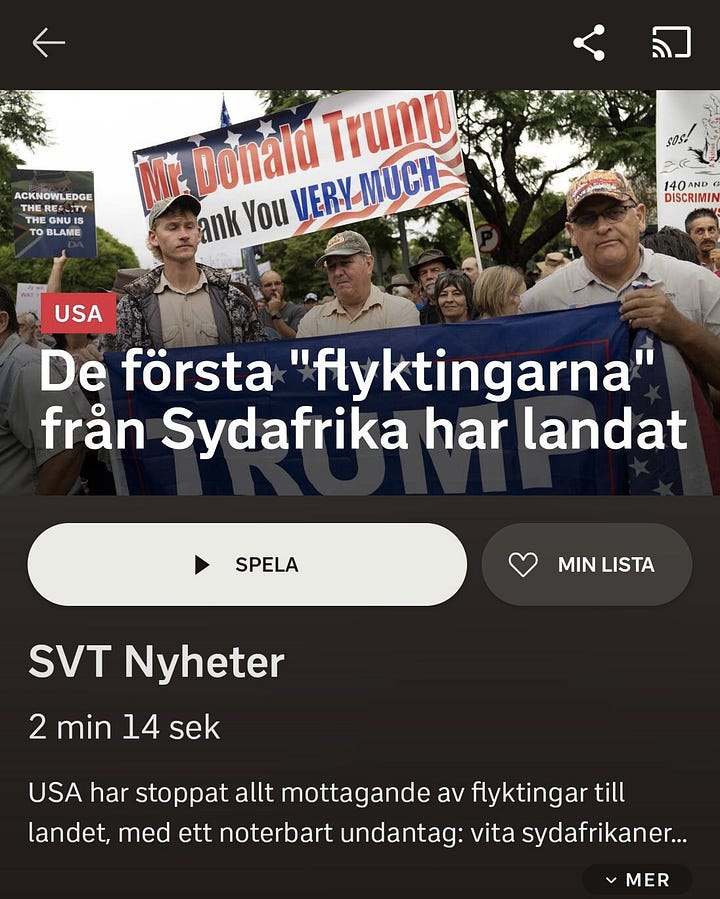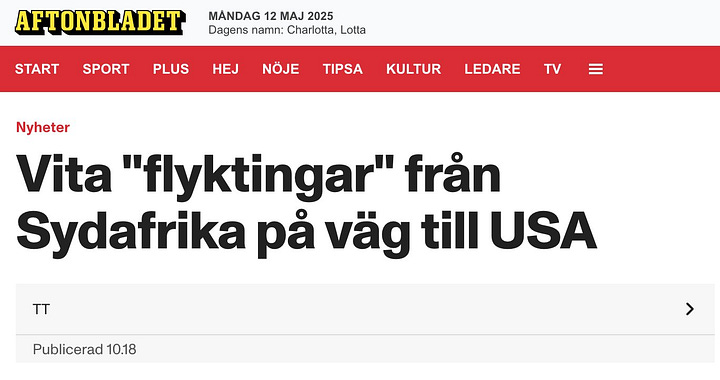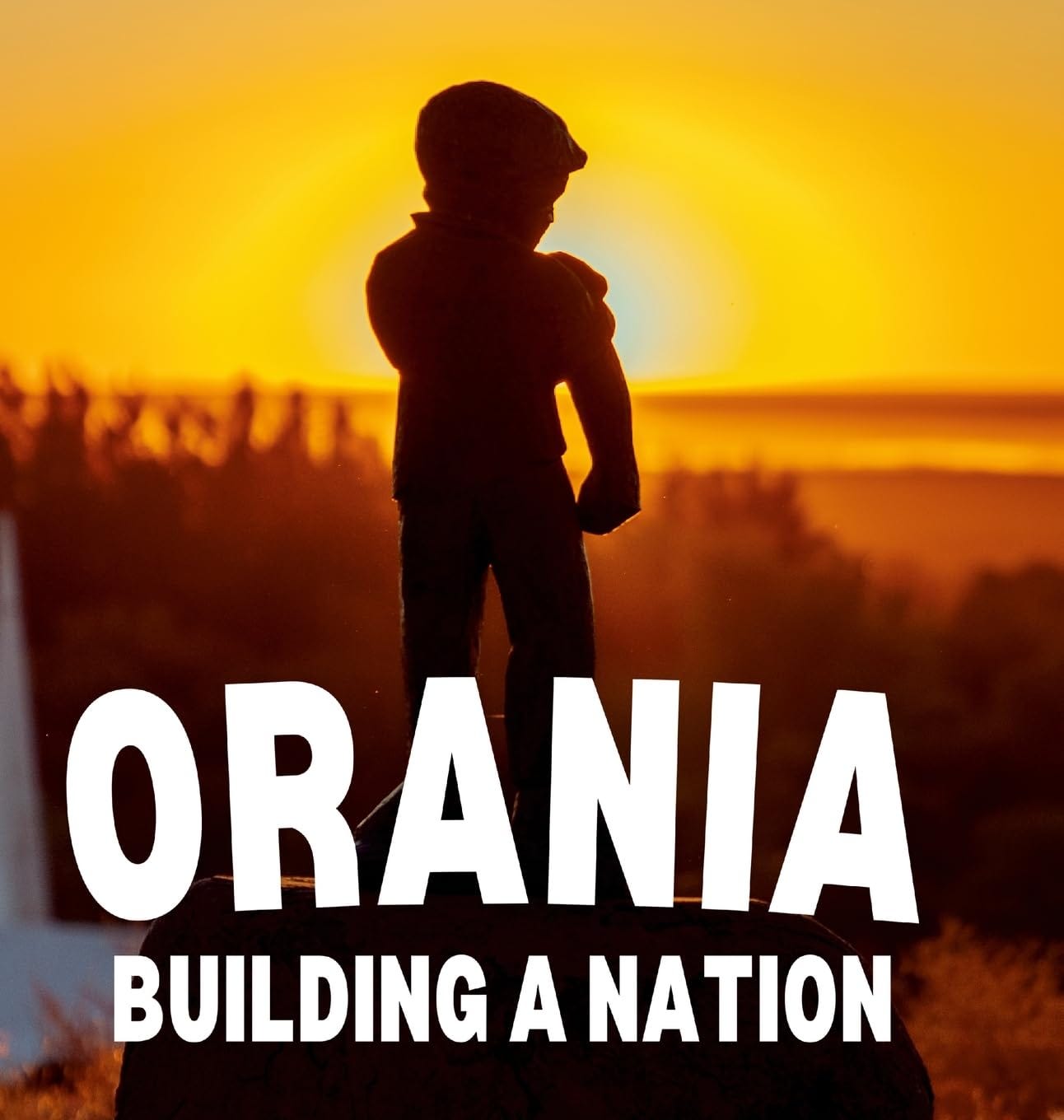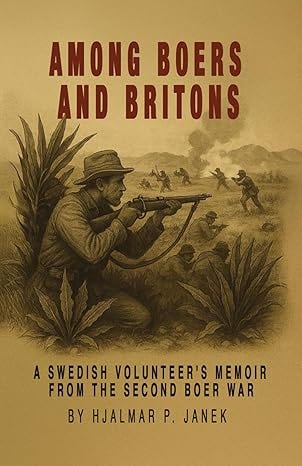When the US Acknowledges a Politically Forbidden Truth
Under the Trump administration, the United States has, for the first time in modern history, recognized the white minority in South Africa—the Afrikaners—as refugees. A first group of 59 people has now arrived on American soil, not as a privileged group in retreat, but as a people in need of protection—persecuted, harassed, subjected to violence and expropriation without compensation, driven from their land by a state that sees their presence as a wrong to be corrected.
This is not just about refugee status. It is a fundamental break with the narrative that has dominated the post-colonial perspective since the 1990s: the idea that the only victim that can exist in Africa is the Black victim, and that the only oppression that can be acknowledged is that exercised by whites. This dogma has been untouchable. It has set the framework for the UN, for Western governments, for journalism and aid policy. Now the first crack has appeared in the facade.
That the United States, under the leadership of Donald Trump, makes an exception from an otherwise almost completely shut down refugee program—specifically for this group—is not just a practical decision. It is a statement: that the West has its own inner circle of belonging. That some deserve our protection not because they are "others," but because they are our own.
What is happening is a breach of the prevailing interpretative prerogative—the narrative that wants the story of Africa to end with the white man leaving the stage for good, silent, ashamed, preferably eradicated not only physically but also from memory. But the Afrikaners refuses to follow the script. They remain, they live, they have asked for help for decades—and now someone has finally listened. Not with prayers, not with self-hatred, but with morally consistent clarity followed by action. By saying: this is wrong. These are people being persecuted for their origin, for their language, for their skin color.
Trump has had the courage to call it what it is. He has pointed to the economic discrimination via BEE legislation, to land theft without compensation, to crowds singing about killing the Boer, to the unbearable, sadistic torture murders of Afrikaner farmers—and he has said what no one else from the establishment has dared to say: Had the roles been reversed, the world would have screamed.
This is an acknowledgment. That there is not the same between being white and being a perpetrator. That there is a limit to what can be accepted. And that the world—at least for a moment—has stopped giving its silent consent to the destructive and vengeful politics that now plague South Africa.
Since the ANC's takeover in 1994, South Africa has transformed into a country where white skin color no longer guarantees equal rights—but rather signals guilt. Under the guise of "justice," a new system of discrimination has emerged. There are more racial laws today in South Africa than during Apartheid.
Why Afrikaners Specifically?
What's interesting is this: The Trump administration, which has severely restricted other refugee immigration, chose to make an exception for precisely these people.
Why? Because the Afrikaners:
share Western values, Christian faith, work ethic,
are capable of integrating quickly and well,
are subjected to targeted hate that is racism—but which global media turns a blind eye to.
This is not a case of "fleeing from war," but "fleeing from systematic, state-supported oppression." It is the kind of need for protection that the Western world is fundamentally obligated to acknowledge—but which almost no one dares to speak about anymore.
It was a group of 59 Afrikaners who landed in Washington. The first of many more expected to follow. And of course, the left could not let it pass. Critics called it "racist" to accept white refugees. The Swedish mainstream media wrote about the event—but put the word refugees in quotation marks, as if to signal that these people don't really count. The Episcopal Church, which for years has received government grants to welcome migrants—and which has prided itself on its support for illegal immigration—now chose to end its cooperation with the state. Not out of conscience, but because they refuse to help this particular group.



In other words: the left shows once again that their "compassion" is conditional. For them, there are no human rights for white minorities.
Trump defended the decision to accept white South Africans as refugees by stating that they are subjected to racial discrimination, violence, and land theft in their home country. He described them as a persecuted minority—victims of a development that would have raised global outcry if the roles had been reversed. According to Trump, a slow-motion genocide is taking place, and the USA has a responsibility to act.
This is also my position. To protect those whom the world has turned its back on. People who are not persecuted for what they have done, but for what they are—for their origin, their belonging, their identity.
South Africa Protests—But Reveals Itself
President Ramaphosa and the ANC responded in the usual manner: there is no discrimination against whites in South Africa, and the Afrikaners are not refugees. They are just—according to the ANC—too comfortable to "take responsibility" for their historical role. In their own words: They are not fleeing from persecution, but from justice, equality, and responsibility for historical privileges.
So this is what the official narrative looks like: wanting to live in safety, on one's land, without threats and torture, is to escape from the "transformation" to a "just society." To oppose land theft, hatred, and political demonization is to be an opponent of "justice." It is a totalitarian distortion of language that should make everyone react—but instead, it is met with silence.
Reality, however, speaks its own language. Thousands of attacks on white farmers, an escalating hatred against Afrikaners as a group, and a state apparatus that either applauds or looks away. Political meetings where people sing about killing the Boer, while media and human rights organizations turn a blind eye.
The truth is that the US decision exposes something deeply uncomfortable: the global establishment's indifference to the persecution of white Westerners. As long as the victims are white, the silence is deafening.
This is a measure—of the establishment's hypocrisy, of morality's selectivity, and of where we ourselves are heading if we cannot see what happens when our identity is made into guilt and justice into revenge.
Until next time,
Jonas Nilsson
PS. A book recommendation on the topic:
📚 Want to see what it takes to stand upright when power turns against you - and how to rebuild when everything else falls apart?
In Orania - Building a Nation, I portray how the Afrikaner minority in South Africa has chosen not just to survive, but to reclaim control over their destiny. A concrete model for peaceful separation and cultural survival - in the midst of a society that has chosen collapse as a strategy.
And in the new edition of Among Boers and Britons, you can follow Hjalmar Pettersson Janek's experiences from the Second Boer War, where the Scandinavian Free Corps fought alongside the Boers against an empire - not merely with rifles, but with heart and soul. I have served as editor for this edition, with a newly written foreword and afterword that places the memoirs in contemporary context.
Together, the two works form a mirror: between then and now, between destruction and reconstruction, between history as tragedy and the future as possibility.
👉 Both are available to order via Amazon:





